
It’s time once again, folks, for another Directorial
Retrospective here on Rhode Island Movie Corner. We’ve covered an eclectic
bunch of filmmakers over the course of this ongoing series. Since it was
started in March 2014, we’ve looked back upon the filmographies of filmmakers
like DC’s current top director Zack Snyder, the master of ‘Bayhem’ himself
Michael Bay, David Fincher, the man behind dark thrillers like Se7en and Zodiac, Christopher Nolan, the man who revived the Batman franchise with his Dark Knight trilogy, and master of
snappy dialogue Quentin Tarantino. And today’s subject is yet another highly
notable filmmaker; the master of quirky macabre himself, Tim Burton. His newest
film, an adaptation of Ransom Riggs’ Miss
Peregrine’s Home for Peculiar Children, hits theaters this weekend so I
thought it’d be the perfect time to look back upon the filmography of the
director who is well known for his uniquely dark and gothic style… and for
repeatedly casting Johnny Depp in his films. He’s had quite a long career, having
been directing feature films since 1985. And he has also worked in the film
industry long before that, including a brief stint as an animator for Disney.
Since then, he’s done quite a lot of different films, from superhero flicks to
stop-motion animated films to even a few biopics. And while critical reception
towards his films has tended to stray a bit more negative with his more recent
efforts, there’s no denying that Burton’s trademark visual style will always be
something to look forward to with each new film that he does, hence why he’s
one of my favorite directors. So with that said, it’s time to look back upon
the filmography of Tim Burton… and for the record, this will only count films that
he himself directed. So even though it’s a major part of Burton’s filmography
to the point where some might actually confuse it as being directed by him, I
will not be covering The Nightmare Before
Christmas in today’s post.
PEE-WEE’S BIG ADVENTURE (1985)
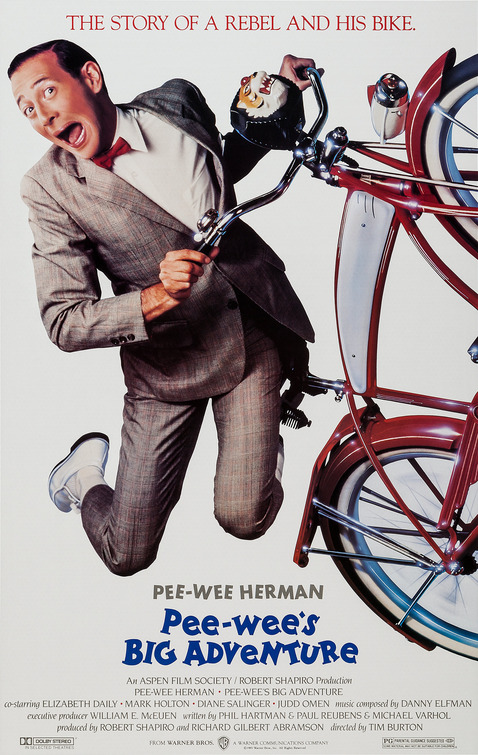
After spending a few years as an animator for Disney,
working on films like The Fox and the
Hound and even Tron, Tim Burton
was hired by comedian Paul Reubens to direct the first feature-length film
starring the latter’s highly popular stage character; Pee-Wee Herman. The end
result was Pee-Wee’s Big Adventure, an
extremely charming family film that very much set the stage for what we would come
to expect from the master of macabre on an annual basis. The film is full of
Burton’s trademark surreal and kooky imagery (e.g. the production design),
which sometimes results in some really freaky scenes, namely the scene in which
Pee-Wee gets a ride from a truck driver named Large Marge (who is later
revealed to be a ‘ghost’) and she pulls one hell of a scary Claymation face at
him. But at its core, this film very much wears its heart on its sleeve. Paul
Reubens of course is excellent as Pee-Wee, the innocent man-child embarking on
the journey of a lifetime to retrieve his most valuable possession; his bike. And
that journey is a very fun one to go on as it is full of memorable characters
and moments, from the scene in which Pee-Wee dances to the song ‘Tequila’ in
order to appease a bunch of bikers to the scene where, while suffering from a
temporary case of amnesia, he notes that ‘he remembers the Alamo’. It all
culminates in a fun chase involving Pee-Wee and security guards through the
Warner Bros. studio lot. With this film, Burton manages to capture a perfect
slice of Americana and as a result, Pee-Wee’s
Big Adventure definitely stands out as one of his most entertaining
directorial efforts. It’s interesting to note that when Reubens first developed
the character, originally his style of humor was a bit more adult. That changed
with this film and the subsequent TV series Pee-Wee’s
Playhouse and as a result, Pee-Wee very much became a cultural icon for
both young and old. That was very much clear to me when I saw how positive the
crowd was at a screening for the very enjoyable follow-up, Pee-Wee’s Big Holiday, at
SXSW this past March. People love Pee-Wee Herman and this film is a prime
example why.
Rating: 4/5
BEETLEJUICE (1988)
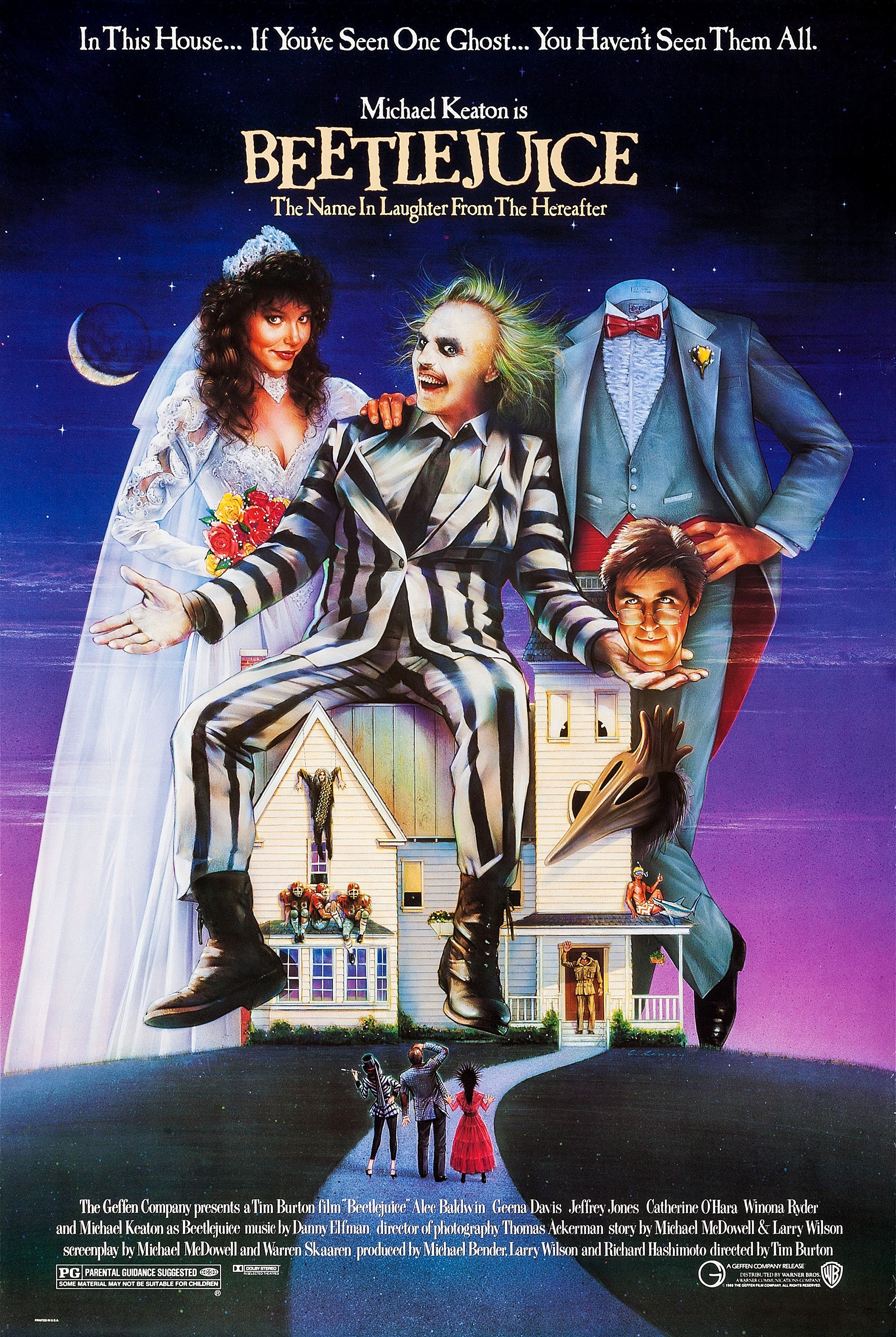
Following his work on Pee-Wee,
Burton then took on an original project in the form of Beetlejuice. The film centers around a couple from Connecticut,
Adam and Barbara Maitland, who unexpectedly pass away after a car accident.
Somehow still connected to the human world, they are then forced to deal with
the unwelcome arrival of a new family, the Deetz family, that moves into their
house. Looking to get rid of them, they consider getting help from the titular supernatural
‘exorcist’ Betelgeuse (note: that’s how his name is spelled in the film) played
by Michael Keaton. But as it turns out, Betelgeuse proves to be quite a
handful. This film is an absolute visual delight, which of course is something that
you can always expect from a Burton film. Not only that but this is a PG-rated
horror film (back when filmmakers were able to get away with that) that greatly
appeals to both young and old, especially thanks to Michael Keaton’s excellent
turn in the title role. Sure he may not actually be in the film as much as you
think (he’s only in it for less than 20 minutes) but he’s an absolute comedic
riot from beginning to end. It very much showcased the versatility of Keaton’s
acting chops, which should’ve been enough proof that he was more than capable
of taking on the lead role in Burton’s next film (more on that in a sec). But
the rest of the cast is really solid as well; Geena Davis, Alec Baldwin,
Jeffrey Jones, Catherine O’Hara, and Winona Ryder in one of her earliest roles.
In short, with an excellent visual style and a scene-stealing performance from
Michael Keaton in the title role, Beetlejuice
is definitely a classic in Tim Burton’s directorial career. What more can
be said but… “Day-o, day-o, Daylight come and me wan’ go home”
Rating: 5/5!
BATMAN (1989)
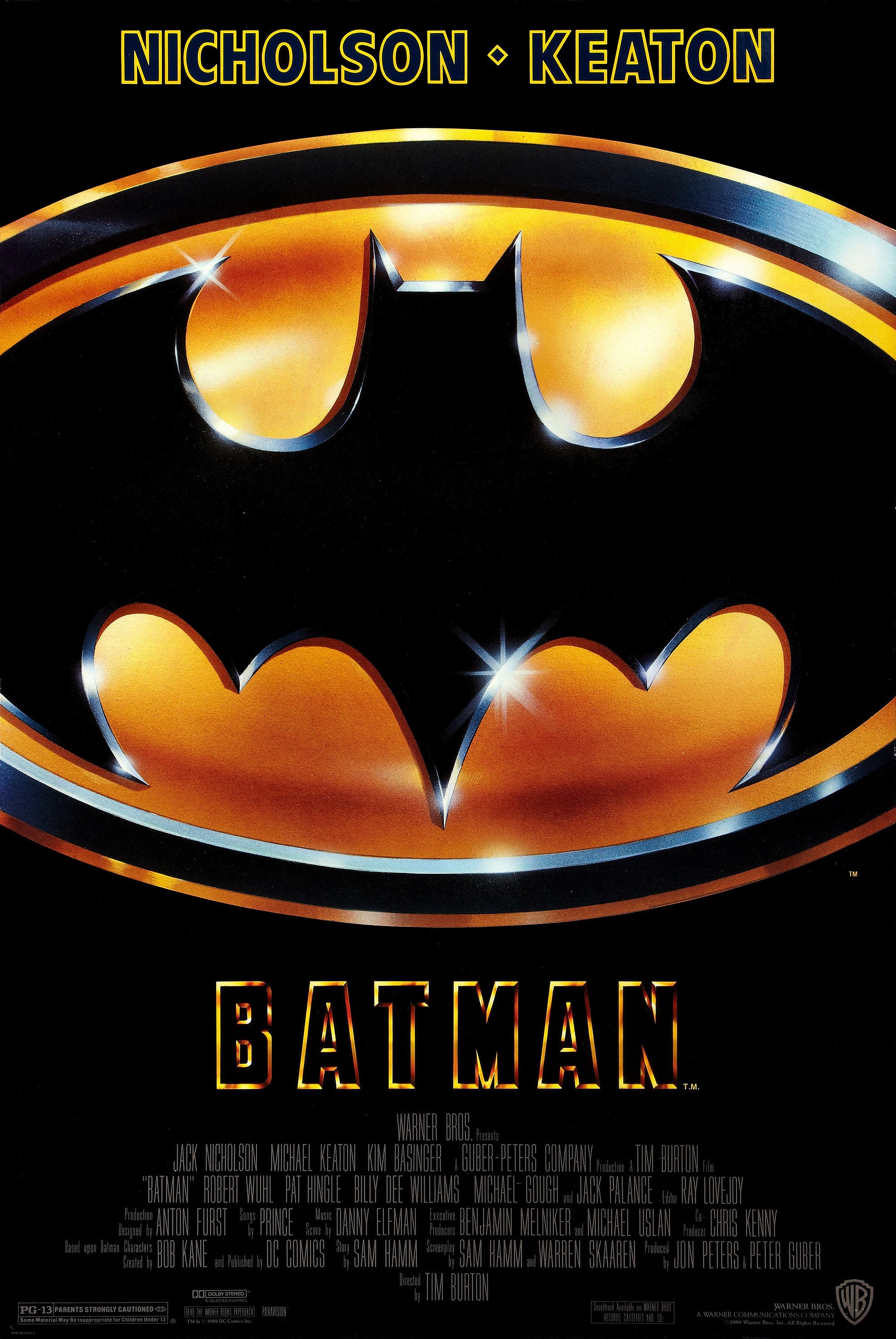
Having talked about this film before in my retrospective onthe Batman franchise back in May
2014, I’ll keep things rather brief this time around in detailing Tim Burton’s
1989 adaptation of the popular DC Comics character of the same name. This film
is very much one of the pioneering entries of the superhero genre, namely in
regards to it establishing a much more serious tone than the more light-hearted
and sometimes very campy superhero film/TV projects of years past, especially
those that involved Batman. As for the film itself, it’s admittedly become
rather dated in certain parts, namely from the odd choice of having a
soundtrack full of Prince songs. However, it still holds up in quite a few
other places, namely in regards to its lead performances. Michael Keaton,
despite being the original archetype of a controversial superhero film casting
choice, proved to be an excellent Batman thanks to his ability to be totally
unassuming while as Batman’s true identity, billionaire Bruce Wayne. But the
real star of the show is Jack Nicholson as the Joker. Nicholson very much
steals the show as the eccentric villain but the film does do a solid job of
balancing out the roles of Batman and the Joker in the story (at least when
compared to the other Burton Batman film…
more on that in a bit). I also like how this film does connect the two
characters by showing that both were responsible for making them who they are
today; the Joker, back when he was known as ‘Jack Napier’, is revealed to be
the mugger who killed Bruce’s parents while Batman is the one who knocks Napier
into a vat of chemicals, which turns him into the Joker. Sure the part about
the Joker killing the Waynes obviously isn’t ‘comic-accurate’ but in the case
of the 80’s era Batman films, I think
it’s a decent plot twist. In short, despite the parts of it that haven’t aged
very well, Burton’s Batman is still a
pretty solid entry in the superhero genre and will always be one of the most
important as it helped kick-start a new generation of films for the genre while
reaffirming Batman’s status as one of the genre’s most popular characters.
Rating: 4.5/5
EDWARD SCISSORHANDS (1990)

Edward Scissorhands is
easily one of Tim Burton’s most personal films. Keeping in line with Burton’s
tendency to focus on outcasts (e.g. Pee-Wee, Batman, etc.), the film tells the
story of the titular Edward, an artificial man whose inventor died before he
was finished, resulting in him having scissor-like tools for hands. Found alone
in the inventor’s abandoned mansion by the local Avon saleswoman, Edward soon
finds himself being introduced to suburban life. What follows is quite simply
one of Burton’s absolute best films. Of course visually the film is excellent,
from Burton’s typical ‘dark’ visuals to the intentionally cheesy pastel colors
that are used for the houses in the suburb. But at its core, the film also very
much wears its heart on its sleeve by allowing us, the audience, to fully
sympathize with Edward. This was the first collaboration between Tim Burton and
Johnny Depp and the latter delivers one of the best performances of his career
as the titular character. He’s very much an endearing character and it’s fun to
watch him interact with the real world. Obviously though, his ‘scissor hands’
prove to be a problem at times, sometimes leading to unfortunate situations.
And I won’t lie… the ending to this film is quite the emotional one as Edward accepts
his fate as an outsider and shares one final moment with the girl he fell in
love with, Kim, played by Winona Ryder who also does a fantastic job here as
well. In short, Edward Scissorhands is
a very touching and beautiful tale of, to quote the film’s theatrical poster,
‘an uncommonly gentle man’. This is arguably Tim Burton’s masterpiece.
Rating: 5/5!
BATMAN RETURNS (1992)
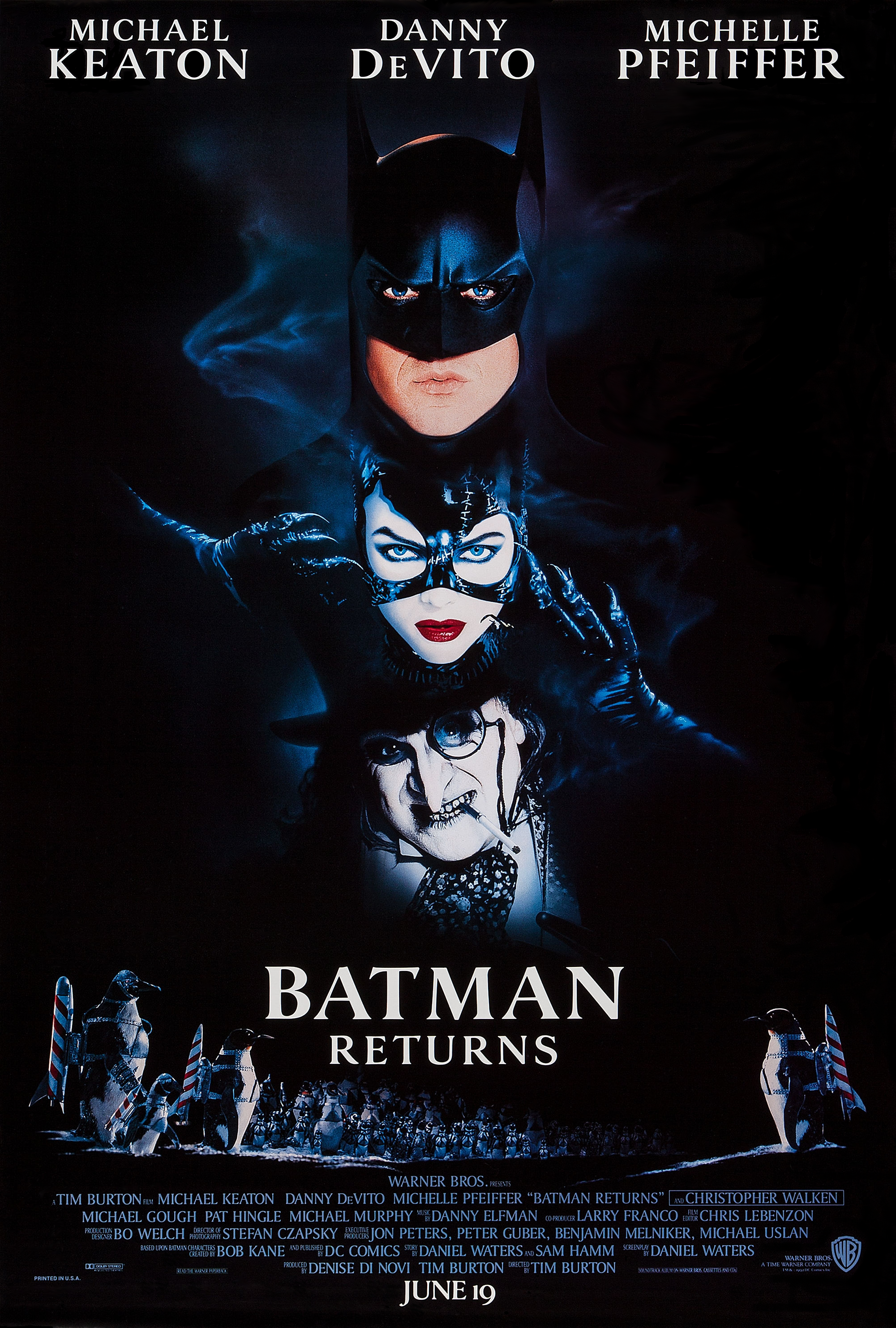
This might be a rather controversial opinion but
unfortunately I don’t think that Burton’s second Batman film, 1992’s Batman
Returns, holds up very well after all of these years. This was very much a
case in which Burton was given perhaps way too much creative control over the
project because while the film once again carries his trademark style, it goes
a bit overboard this time around. It legitimately gets to the point where it
actually proved to be rather controversial amongst parents, to the point where
McDonald’s canceled their Happy Meal toy-line for the film, who didn’t want
their kids to see it due to more intense scenes of violence and even a few sexual
innuendos. And yeah, all of the sexual references do feel quite out of place.
Seriously the whole scene in which Catwoman and the Penguin meet for the first
time is pretty much nothing but sex talk (Penguin: “Just the pussy I’ve been
looking for”). But another issue with the film is that it actually restricts
the role of Batman in the story despite the fact that, you know, he’s supposed
to be the main character of the damn film. Clearly Tim Burton wasn’t that big a
fan of the character because in both films, the villains technically get more
screen-time than the Dark Knight himself. It may have worked fine in the previous
film as a result of the solid balance between Michael Keaton and Jack Nicholson
and their overall roles in the plot but here Keaton really doesn’t get much to
do this time around. Instead, the focus shifts more towards Danny DeVito’s
Penguin and Michelle Pfeiffer’s Catwoman, who are admittedly rather ‘meh’
villains at best.
DeVito’s take on the Penguin very much contrasts with the
typical portrayal of the character in the comics. Instead of being a classy
mobster and a ‘gentleman of crime’, this film envisions the character as a
deformed/creepy ‘sideshow freak’ who plots to kidnap/drown all of Gotham’s
first born sons. And while the film does try to make the audience feel sorry
for him at times due to his tragic backstory as an orphan and scenes in which
he is ridiculed, his generally detestable nature and, you know, the
aforementioned ‘killing first born sons’ scheme basically negates any of the
film’s attempts at doing just that. At the very least, DeVito is still pretty
memorable in the role. As for Pfeiffer as Catwoman, her overall role in the
plot lacks focus at times but she is very much one of the film’s biggest
standouts as the iconic ‘cat burglar’. Christopher Walken also proves to be
quite memorable as the other ‘villain’ of the film, businessman Max Schreck.
But as I stated earlier, an overt focus on the villains, not enough Batman, and
an overuse of Burton’s visual style results in a film that’s way too dark and
actually rather dull for the most part. As far as the pre-Nolan era Batman films are concerned, I actually
prefer Joel Schumacher’s first Batman film,
1995’s Batman Forever, over Returns. And I know that seems like
blasphemy to some people but A.) at least I didn’t say Batman and Robin, am I right? And B.) as cheesy as Schumacher’s
films are compared to Burton’s films, Forever
actually focused on Batman even with its dual villains (which actually
became the trend for all future Batman films
leading up to Batman v Superman). So
unfortunately, due to a lack of focus, especially in regards to its titular
protagonist, as well as an overly dark style, Batman Returns was a pretty lackluster follow-up to the 1989 Batman.
Rating: 2.5/5
ED WOOD (1994)

Serving as Tim Burton’s very first R-rated feature, Ed Wood tells the true story of filmmaker
Edward D. Wood Jr., who in the 50’s became known for directing a bunch of films
that would become regarded as some of the worst of all-time, namely due to his
tendency to shoot fast and on the cheap. Specifically, this film focuses on the
productions of three of his most famous films; 1953’s Glen or Glenda, 1955’s Bride
of the Monster, and 1959’s Plan 9
from Outer Space. However, despite the poor reception that his films have
garnered over the years, this film actually doesn’t try to demonize him. Instead,
it celebrates him not by the merit of his work but through his passion for the
art. No matter what the struggle, whether it was his producers constantly
giving him notes or him not having enough money for filming, he mustered on
because he loved doing what he was doing. As a result, up-and-coming filmmakers
will no doubt connect with this film and more importantly the dreams of its
main character and the idea that one’s visions are worth fighting for, the
latter of which is told to Wood by none other than Orson Welles (played by
Vincent D’Onofrio but voiced by Maurice LaMarche in a memorable cameo). But the
film itself is also a highly entertaining biopic that’s very well-shot with its
great use of black-and-white and its great attention to detail in regards to
recreating the low-budget stylings of Wood’s films. Johnny Depp absolutely
shines in the role of Ed Wood while Martin Landau absolutely transforms into
horror icon Bela Lugosi in his Oscar-winning turn. Ed Wood is a film that both celebrates and makes fun of its title
character. It recognizes that his films weren’t really of the best quality but
it celebrates him for his unabashed passion. The end result is definitely
another one of Burton’s best… and also one of his most underrated because it
didn’t do so well commercially. Regardless, film fans will no doubt love this
clearly unconventional love letter to the art of filmmaking.
Rating: 5/5!
MARS ATTACKS! (1996)
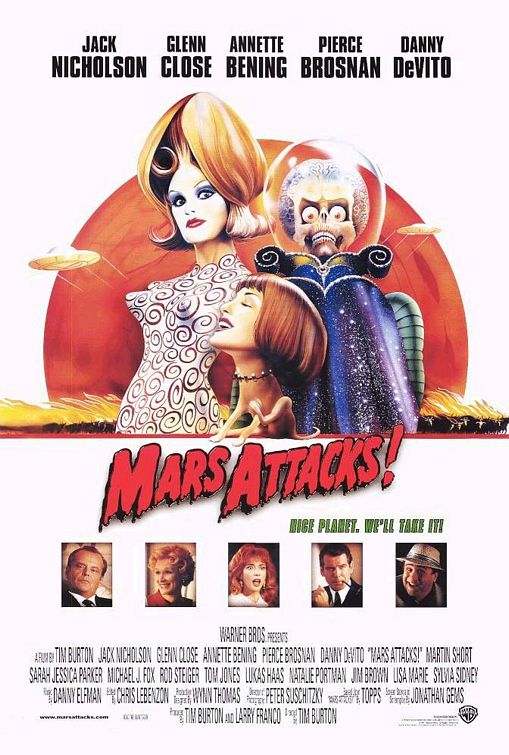
Based on the ‘infamous’ sci-fi themed trading cards of the
same name that were produced in 1962, Mars
Attacks!... is a very, very goofy film. That’s the key thing to remember
when it comes to this film; it is absolutely ridiculous from beginning to end.
With this film, Tim Burton very much made a sci-fi B-movie. From the
intentionally cheesy visual effects (that were originally meant to be done via
stop-motion animation before being changed to CGI in order to keep costs down)
to the massive ensemble cast portraying a group of straight-up stereotypical
characters, this is very much paying homage to the sci-fi B-movies of the 50’s.
And when I say massive ensemble cast, I mean ‘massive ensemble cast’. You got
Jack Nicholson (in two different roles, no less…), Glenn Close, Annette Bening,
Pierce Brosnan, Danny DeVito, Sarah Jessica Parker, Martin Short, Michael J.
Fox… and that’s seriously just to name a few. Admittedly the film takes a
little while to get going as it doesn’t really get into anything alien-related
until half an hour in. But once they do officially bring in the aliens and they
start blowing s*** up… yeah that’s when the film starts to get really
entertaining. Like the other big alien sci-fi flick that was released in 1996, Independence Day, this is very much an
unadulterated popcorn flick. It is completely silly and the scenes in which the
aliens attack are completely chaotic… and this film is very much self-aware of
that. It clearly knows how goofy it is. I mean for crying out loud the way the
aliens in this film are killed is via Slim Whitman’s ‘Indian Love Call’. In
short, do not go into this film expecting Oscar-worthy material because you
obviously aren’t going to get any of that here. It’s pretty darn mindless and
completely cheesy from beginning to end… and it’s so damn entertaining. What
more can be said but… Ack Ack! Ack Ack!
Rating: 3.5/5
SLEEPY HOLLOW (1999)
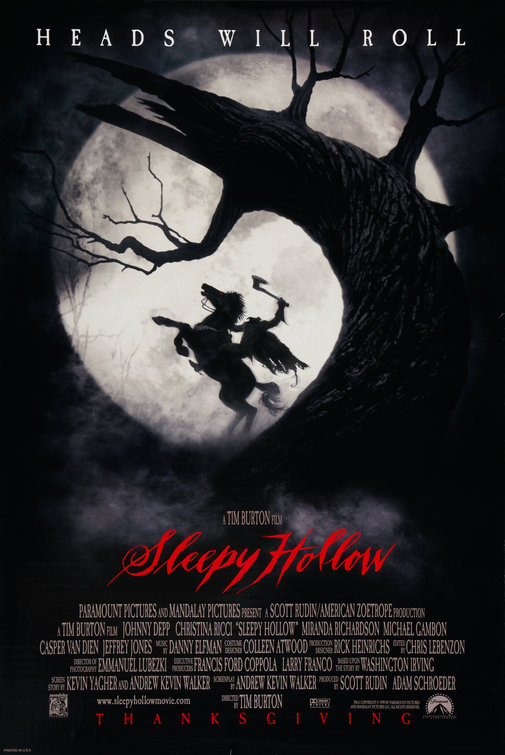
Burton’s first major R-rated ‘horror’ film, Sleepy Hollow is a unique spin on the
classic short story ‘The Legend of Sleepy Hollow’ by Washington Irving, which
was most famously adapted by Disney in 1949. Burton’s version takes it in a
much darker direction while also straying in certain ways from the original plot.
Namely, this film re-imagines the character of Ichabod Crane as a police
constable who investigates into a series of killings in Sleepy Hollow that were
supposedly committed by the mythical ‘Headless Horseman’. But ultimately this
film isn’t as much of a ‘horror’ film as you might expect. It certainly has
some dark moments as well as a solid atmosphere but overall the film actually
sort of maintains a rather campy tone. That’s pretty much Burton’s filmography
in a nutshell. Even with all of his films’ dark undertones and creepy imagery,
they tend to be very light-hearted in tone to the point where some might find
the humor in his films to be a bit too silly at times. But in the case of Sleepy Hollow, perhaps that was the
point. This could be seen as an ode to the classic horror films produced by
Hammer Films, namely from a stylistic perspective, and if you’re able to accept
all of the goofy moments in this film, you’ll find it to be a pretty
entertaining horror adventure. Depp is solid as Ichabod and is joined by an
impressive ensemble cast that includes Christina Ricci, Michael Gambon, and
even Christopher Walken, yes Christopher Walken, as the Headless Horseman. So
in short, I suggest that you go into this not taking it too seriously and not
expecting it to be a straight-up horror film because if you do, you might be
rather disappointed.
Rating: 3.5/5
PLANET OF THE APES (2001)
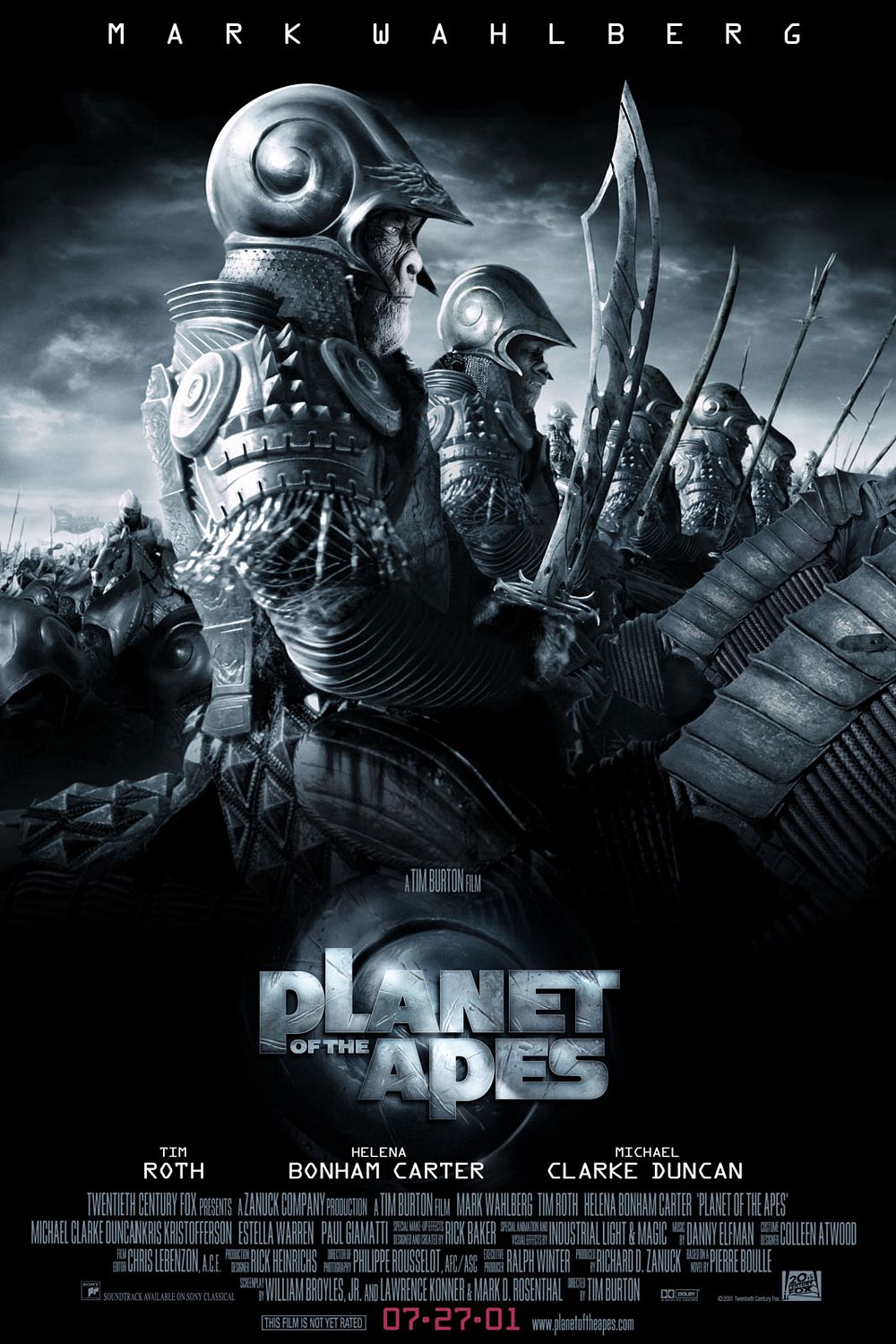
Just like Burton’s Batman
films, I had gone over this film before in a previous post. In this case it
was my retrospective on the Planet of the Apes franchise back in 2014 so, again, I’m going to keep things simple on
this one. Basically, this was a case in which Burton wasn’t really the best
choice to helm a film like this. This remake of the 1968 sci-fi classic Planet of the Apes doesn’t really feel much
like a Burton film at all. Seriously if it wasn’t for the fact that Burton is
one of those filmmakers who always does opening credits in his films, you’d
swear it was directed by someone like Steven Spielberg. This is probably the most
‘Anti-Burton’ esque film of his career and it really shows. It’s also quite
dull for the most part and most of the actors’ performances reflect that,
namely Mark Wahlberg in the lead role of astronaut Leo Davidson. The only real
standout member of the cast is Tim Roth as the main villain, General Thade. And
of course, as many have pointed out, the film’s biggest disaster comes in the
form of its ending. Simply put, it makes no sense as there was no indication as
to how Thade managed to escape from the imprisonment that he ended up in during
the final battle and was able to basically become the leader of an all-ape
Earth. While Burton claims that this was meant to set up a sequel, that sequel
never came to be and instead the franchise rebooted with the Andy Serkis-led Rise and Dawn of the Planet of the Apes, which to put it bluntly are very
much superior films. I’ll admit I don’t dislike this film as much as most of
the internet does but there’s no denying that it was a pretty darn lackluster
remake and one that Burton probably shouldn’t have decided to take on as it
ends up being the least ‘Burton’ esque of his entire career.
Rating: 2/5
BIG FISH (2003)
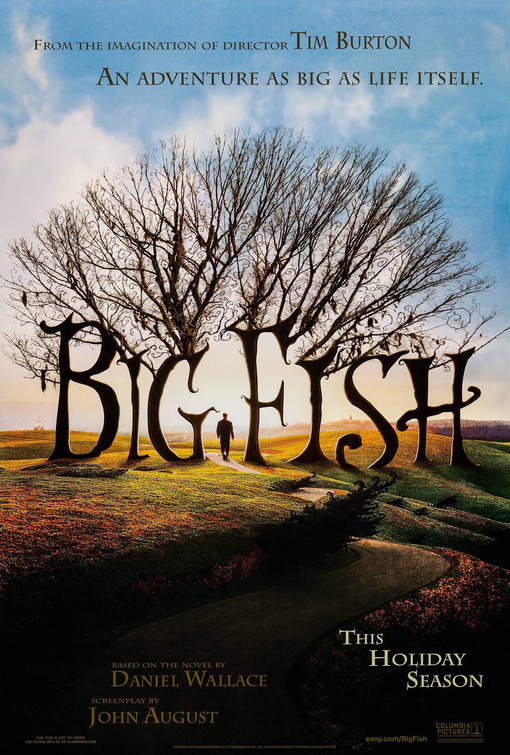
In a way, Big Fish is
Tim Burton’s Forrest Gump. Both films
center around an individual and the fantastical adventures that this person has
during his life. However, this film is so much more than just ‘Tim Burton’s Forrest Gump’. It is a particularly
personal tale of a man who tries to reconnect with his father during the
latter’s final days, as he feels that he doesn’t really know anything about his
father as the result of all of the ‘tall tales’ that he often tells. So is the
tale of Edward Bloom, who according to his stories met a giant, worked in a
traveling circus, and caught a big catfish using his wedding ring as a lure,
among other things. All of this results in an extremely charming ‘fantasy
drama’ that very much maintains Burton’s knack for a unique visual style. The
film also has a terrific ensemble cast, including Ewan McGregor as young
Edward, Albert Finney as old Edward, Billy Crudup as Edward’s son Will, Jessica
Lange as Edward’s wife Sandra, Alison Lohman as young Sandra (and seriously
talk about one of the most pitch-perfect ‘younger version of a character’
castings ever because Lohman so closely resembles Lange in this film), Marion
Cotillard as Will’s wife Josephine, Danny DeVito, Steve Buscemi, Helena Bonham
Carter, and so on and so forth. I’ll admit that when it came to this particular
entry in Burton’s filmography, I went into it fairly blind. I had heard about
it before but never really knew much about it. And that ultimately was the lead-in
to how I first watched this film… and I was pleasantly amused by what I saw.
Overall I do think that it’s one of Burton’s best films; certainly one of his
more underrated efforts. It’s very much a Burton film but one that has a strong
emotional core as shown through the reconciliation of Edward and Will Bloom. If
you haven’t seen this one before, this is one that I do highly recommend.
Rating: 4.5/5
CHARLIE AND THE CHOCOLATE FACTORY (2005)
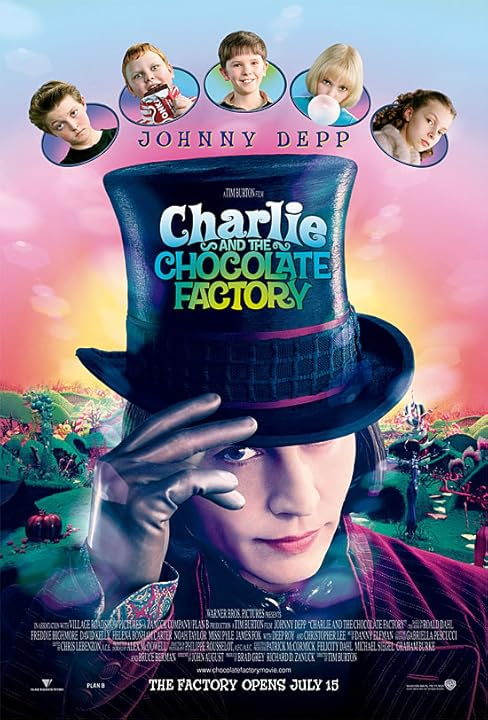
And now we come to what is, in my opinion, one of the most
underrated films of the 21st century. Sure it did well at the
box-office and it fared perfectly fine with critics but it seems to me that you
don’t really see this film talked about that much in a positive manner
nowadays. I find that this is mostly due to the result of comparisons between
this film and its predecessor, 1971’s Willy
Wonka and the Chocolate Factory, and I can only imagine how much more
frequent these comparisons have become in the wake of the recent passing of the
original film’s Willy Wonka, Gene Wilder (R.I.P.). But when it comes to this
new adaptation of Roald Dahl’s classic children’s novel, I feel that Burton’s
version is arguably just as great as the original film. Now the main reason why
this film tends to get a lot of flak nowadays is Johnny Depp’s turn in the role
of Willy Wonka. And yes, I’ll admit that there is a quite noticeable
awkwardness to his performance as Wonka, with Depp’s version of the character acting
very ‘Michael Jackson’-y throughout. Not only that, but compared to Gene Wilder’s
Wonka, Depp’s Wonka doesn’t really seem to care that much about the kids who
win the Golden Tickets even though, as we all know, the whole point of the
‘factory tour’ was that he was trying to find an heir. However, I don’t think that
he’s outright terrible in the role. He legitimately does have his moments from
time to time, which admittedly is due to the fact that, as noted earlier, this
Wonka can be rather awkward at times, like when he tries to sound hip while
talking to Mike Teavee. And for the record I don’t care how stupid it is, I
always laugh when he says ‘Slide me some skin, soul brother!’ I also think that
it’s actually pretty cool that the film decides to explore the character’s
back-story, namely his rocky relationship with his father Wilbur (Christopher
Lee).
Ultimately, though, one of the main reasons as to why I feel
that this version is just as good as the original is the fact that this version
is actually much more faithful to the novel. That’s nothing against the 1971
film, for the record, but admittedly that version did deviate from the source
material quite a bit, from Charlie’s father being ‘absent’ to having the
character of Slugworth, Wonka’s candy-making rival, blackmailing the kids into
stealing Everlasting Gobstoppers. Simply put, there’s a good reason why Dahl
wasn’t too big on that version, to the point where he refused to have an
adaptation made of the sequel novel, Charlie
and the Great Glass Elevator. As for the newer film, while there are still
some changes (e.g. the aforementioned added back-story given to Wonka), it does
stick to the plot of the novel a lot more. Plus, as one would expect from a Tim
Burton film, it’s an absolute visual delight from beginning to end, especially
once the characters enter Wonka’s fabled chocolate factory. From the elaborate
rooms of the factory to the Oompa Loompa songs done by Danny Elfman that were
lifted straight from the books, this is a very entertaining film that is very
much a Burton film in every way. It’s a shame, then, that the film doesn’t get
a lot of positive attention nowadays. And don’t get me wrong, if I were to
compare the two Chocolate Factory films,
the original is still the better film; it’s a classic in every sense of the
word. However, that doesn’t mean that Burton’s take on the story isn’t worth
checking out too. Ignoring Johnny Depp’s take on Willy Wonka for a moment, the
film primarily shines thanks to its faithfulness to the source material and Burton’s
always terrific visual style. This was always a personal favorite of mine
growing up and as a result, I’d argue that it’s just as good as the original
and is most certainly better than the internet frequently puts it out to be.
Rating: 5/5!
(Yes, 5/5!)
CORPSE BRIDE (2005)
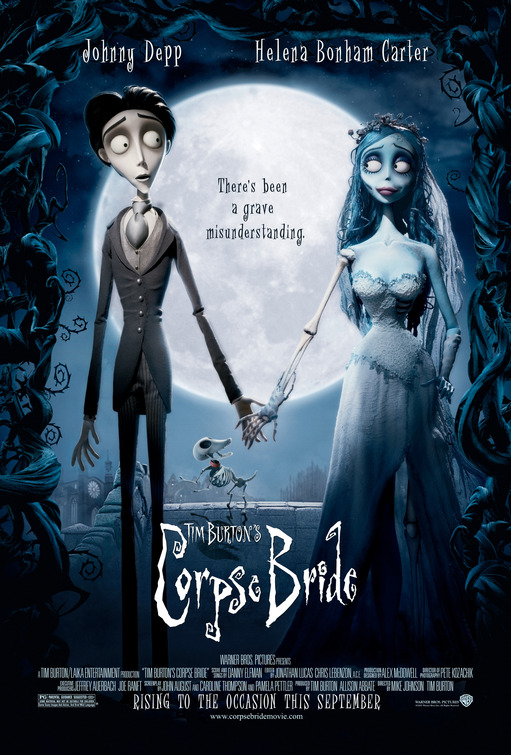
While 1993’s The
Nightmare Before Christmas obviously still stands as the most famous
stop-motion animated film that Tim Burton was involved with, there is a common
misnomer that he himself directed the film. However, while the film very much
felt like a Burton film in every way, it was Henry Selick who directed the film
while Burton only produced it. 2005’s Corpse
Bride was Burton’s first true stop-motion animated directorial effort.
Released just a few months after Charlie
and the Chocolate Factory and co-directed by Mike Johnson, who was an
animator for both Nightmare and the
other stop-motion film directed by Selick and produced by Burton, James and the Giant Peach, the film’s
animation was done by none other than the current top dogs of stop-motion
animation, Laika Entertainment. As a result, the stop-motion animation is just
as terrific as it has been in their more recent efforts. Design-wise, this is a
Burton film through and through and it maintains his trademark dark and quirky
gothic style complete with some fun bits of humor, some legitimate emotional
moments, and a collection of toe-tapping songs provided by, who else, Danny
Elfman. The story, in which a young man named Victor (voiced by Johnny Depp)
accidentally ends up ‘marrying’ a ‘corpse bride’ named Emily (voiced by Helena
Bonham Carter), is an enjoyably original ‘fairy tale’-like story and Depp and
Bonham Carter do a really nice job in regards to making their characters a
likable lead duo, particularly Bonham Carter as Emily. I wouldn’t go as far as
to say this is Burton’s ‘best’ stop-motion animated film, as a result of it
being perhaps a little underwritten in some parts (i.e. the villain), but it’s
still a very enjoyable 75-minute affair that is pure Burton in every sense of
the word.
Rating: 4/5
SWEENEY TODD: THE DEMON BARBER OF FLEET STREET (2007)
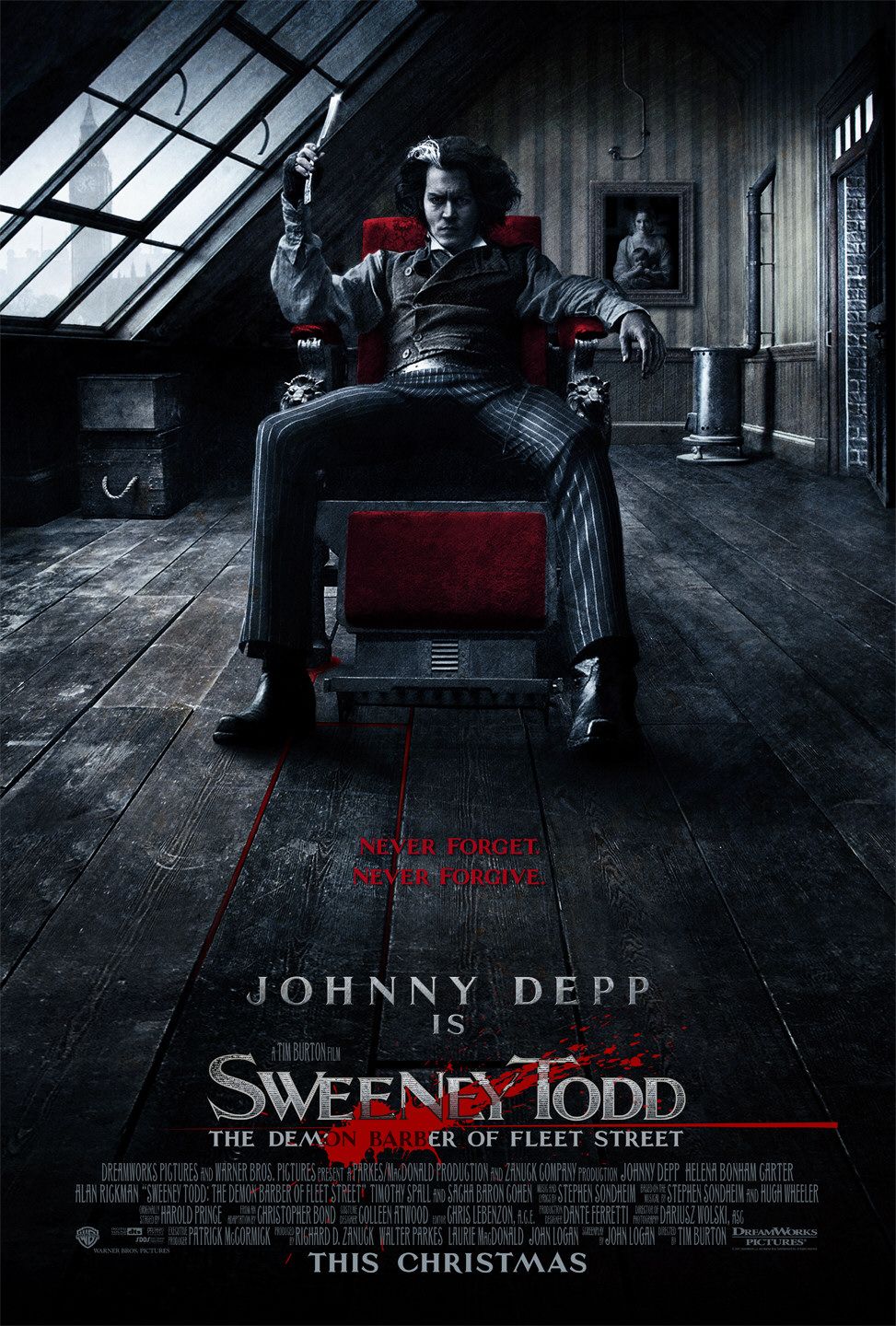
For his next film, Burton took on his first full-blown
musical with an adaptation of Stephen Sondheim’s 1979 Tony Award winning
musical, Sweeney Todd: The Demon Barber
of Fleet Street. Johnny Depp (of course) stars as the titular Sweeney Todd
AKA Benjamin Barker, a London barber who enacts his revenge against those who
wronged him in the past, namely the Judge that banished him due to the
affections that he had for Todd’s wife, by killing them during appointments
with him. All the while his assistant, Mrs. Lovett (Helena Bonham Carter, of
course), uses the bodies for her meat pies. Like Sleepy Hollow, this is very much an R-rated Tim Burton film;
violent and bloody. But also like that film, the graphic violence of this
film’s story is, in a way, played up more for camp. All of this comes together
in yet another delightfully visual flick, courtesy of Burton, while also being
well-balanced by Sondheim’s music. And said music is handled very well by the
cast, even Johnny Depp who is obviously not known for doing musicals. Probably
my favorite songs from the soundtrack include the piece ‘Johanna’, sung first
as a solo by sailor Anthony (Jamie Campbell Bower) as he becomes enamored by
Todd’s titular daughter and later done as a quartet involving Anthony, Todd,
Mrs. Lovett, and a beggar woman, and ‘Pretty Women’, a duet between Todd and
his arch-enemy, Judge Turpin (Alan Rickman). As someone who is a fan of
musicals, I feel that this is definitely up there as one of the best of the
past few years. It was certainly an ‘against-type’ kind of film for Burton but
ultimately the dark nature of the musical’s plot ended up matching perfectly
with his directorial style. As a result, the film is a delightfully campy but
stylistically terrific experience.
Rating: 4.5/5
ALICE IN WONDERLAND (2010)
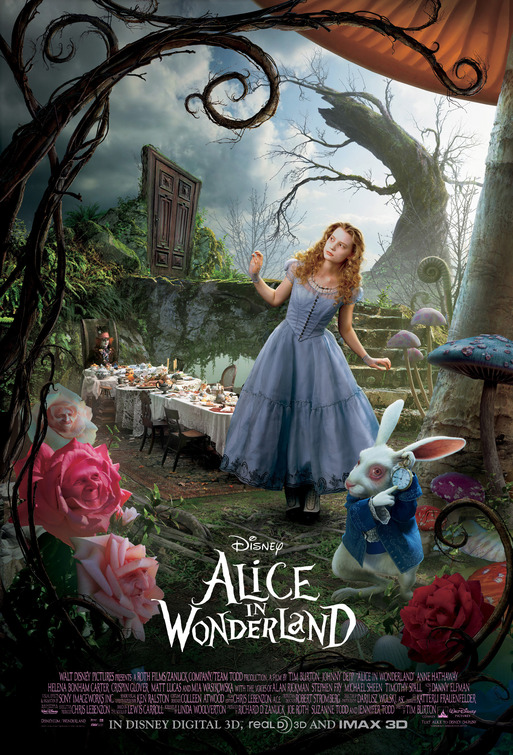
Burton’s slew of polarizing ‘remakes’ continued with Alice in Wonderland, the first of
Disney’s current trend of live-action re-imaginings of their animated classics.
In this case, however, Burton’s Alice is
actually a ‘pseudo-sequel’ to the events of Lewis Carroll’s original novel and,
in turn, the original Disney animated film from 1951. The film sees a teenaged
Alice return to Wonderland (referred to in the film as ‘Underland’) where she
finds herself caught in the middle of a conflict between the Red Queen (Helena
Bonham Carter) and the White Queen (Anne Hathaway) for control of Underland. As
noted before in my review of the sequel, while Burton’s film proved to be quite
polarizing amongst critics and audiences, it did somehow manage to reach a
billion at the box-office. So to reiterate another point from that review, that
means that while this film very much has its critics, it also has its fans and
I’m not afraid to admit that I am a fan of these live-action Alice films. Sure they do have some
noticeable flaws, namely in regards to the writing. In the case of this film,
the plot does seem a bit too complicated at times for a story that’s usually portrayed
as being nothing more than a series of random encounters that Alice has in the
world of Wonderland (sorry, Underland). All this stuff about her having to live
up to the prophecy of her being the one who slays the Jabberwocky kind of
hinders the film because Alice ends up spending most of the film unsure of herself
and constantly denying what’s going on by saying that she’s only in a dream. It
wouldn’t be until the next film when Alice truly became a confident heroine. It
should also be noted that perhaps Burton’s ‘dark’ style was a bit overdone in
this film as it maintains a generally diluted color scheme throughout. Not only
that, but there are a few scenes that do kind of push the limit of the PG
rating, most infamously a scene in which Alice traverses the Red Queen’s moat
on the heads of her victims.
But despite the flaws of its script, I still found the film
to be fairly enjoyable. Even with the rather gloomy color scheme, the visual
effects and overall production design in this film truly are fantastic. Sure
they may get a little overbearing after a while, namely due to the fact that
almost all of the scenes set in Underland were pretty much shot entirely on a
green-screen, but this film still very much succeeds in regards to its visual
style. As with the cast, they’re perfectly fine. As noted earlier, Mia
Wasikowska’s Alice stood out more as a lead heroine in the sequel but she’s
still fine here. The same can be said for Johnny Depp as the Mad Hatter. Of the
‘human’ cast, the biggest standout of the film is Helena Bonham Carter as the
Red Queen. Simply put, the character is an extremely over-the-top villain and
Carter absolutely steals the spotlight whenever she’s on screen. But the film
also has a pretty impressive voice cast who take on the roles of the various
creatures of Underland, including Stephen Fry as the Cheshire Cat and Alan
Rickman as Absolem the Caterpillar. So in short, while this film certainly
isn’t perfect it’s not one of the worst things either (the same can be said for
its sequel but we’re not talking about that one today seeing how it wasn’t
directed by Burton). If you’re someone who’s a big fan of the Carroll books,
I’m pretty confident that you’re going to absolutely detest this film for all
of the changes made to the world of Wonderland and its characters. But if
you’re willing to accept some of the stranger elements of this particular
adaptation, it’s ultimately harmless. I’ll admit I’m still sort of boggled by
the fact that this film managed to gross over $1 billion at the box office
despite its generally mixed to negative reception but like I’ve saying over and
over again, these films ‘do’ have their fans so there’s at least one legit
reason why it was able to reach that mark.
Rating: 3.5/5
DARK SHADOWS (2012)
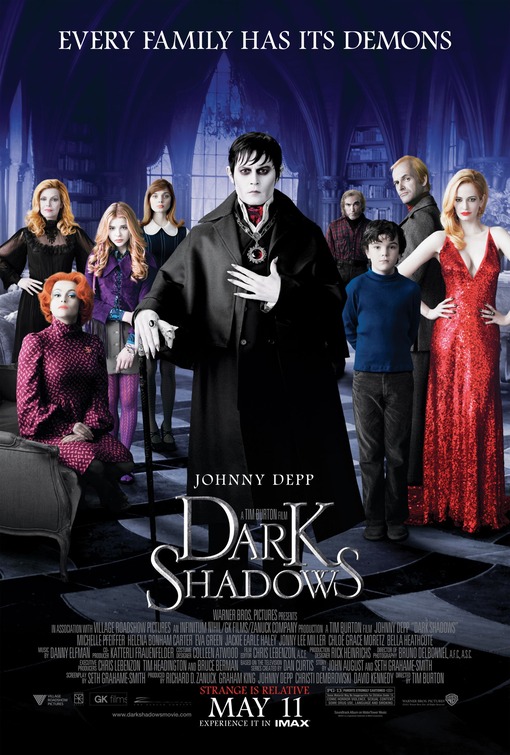
The most recent collaboration between Tim Burton and Johnny
Depp to date, Dark Shadows is based
on the gothic soap opera of the same name created by Dan Curtis that ran from
1966 to 1971. The film, however, is unfortunately a rather bland affair despite
the best efforts of Burton and the film’s cast. The biggest problem with the
film is that it is very uneven, primarily in tone. The film mostly tries to be
a comedy with its ‘fish out of water’ plot of Barnabas Collins (Depp) adapting
to modern life in 1972 after being buried alive for nearly two centuries after
being turned into a vampire by a vengeful witch. However, at times the film
also tries to be a dark horror flick and while that actually does keep in line
with the show’s original tone, it means that the film is constantly off tonally.
And even then, the humor in the film is pretty lackluster. There are a few
legit chuckles here and there but ultimately most of the jokes fall flat. This
general unevenness also extends to the writing as well. Focused primarily on
Barnabas and the conflict that he has with the witch who turned him into a
vampire, Angelique (played by Eva Green, who enjoyably vamps it up in the
role), certain members of the cast end up getting severely underused as a
result. This includes Jonny Lee Miller as Roger Collins, to the point where
he’s literally written out of the film entirely before it’s over, and Chloe
Grace Moretz as Elizabeth Collins’ (Michelle Pfeiffer, who’s easily one of the
biggest standouts of the film) daughter Carolyn who without giving it away has
a rather big reveal at the end that comes right out of nowhere. So
unfortunately, Dark Shadows ends up
being a really disappointing effort from the duo of Burton and Depp. While I’m
sure that they put their all into it, and the film certainly does have Burton’s
trademark visual style along with a pretty nice 70’s rock soundtrack, the film ultimately
suffers from a severe lack of focus when it comes to trying to figure out just
what it wants to be.
Rating: 2/5
FRANKENWEENIE (2012)
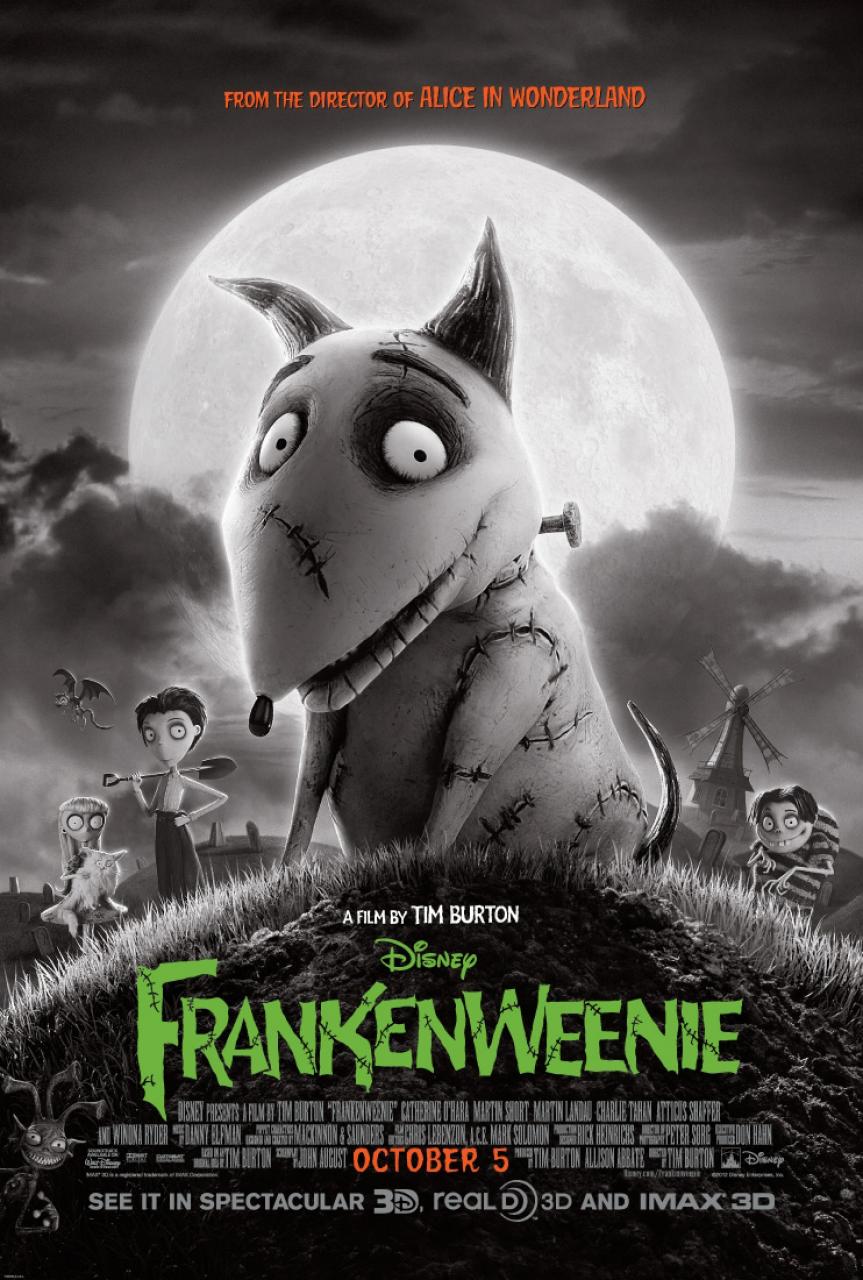
In 1984, back when he was still working at Disney, Tim
Burton directed a 30-minute black-and-white short film titled Frankenweenie about a boy named Victor
Frankenstein who, in the footsteps of his namesake from the classic novel Frankenstein by Mary Shelley,
re-animates his dog Sparky with electricity after he is hit by a car. However,
this ended up getting Burton fired from Disney because the studio felt that he
had wasted company resources on a project that they felt they couldn’t market
to their usual target audience. However, the short film was eventually released
on home video, albeit partially censored, and 28 years later, after Burton
re-teamed with Disney to make Alice in
Wonderland, Burton returned to his original story to make a feature-length
black and white stop-motion animated remake. In preparation for this film, I
did watch the original short film and I must say that it’s quite good. Even as
a fairly short 30-minute film, it was very much one of the early showcases of
Burton’s talents as a director. The same can be said for the remake as well.
Obviously some things had to be added to meet a longer run-time, namely a
subplot in which Victor’s classmates re-animate their own pets, but the same
solid story, which at its core is a heartwarming ‘boy and his dog’ story but is
also a fun homage to classic monster films, namely Frankenstein of course, is still very much there. The stop-motion
animation is excellent, especially thanks to the film maintaining the
original’s black and white color scheme, and, of course, perfectly captures
Burton’s gothic and quirky style. So in short, Tim Burton’s feature-length take
on Frankenweenie is definitely
another one of his best films as it’s also another one of his most personal
efforts. I’m not going to compare this film to its live-action predecessor but
I will say that both are very good and showcase his talents as a filmmaker.
Rating: 4.5/5
BIG EYES (2014)
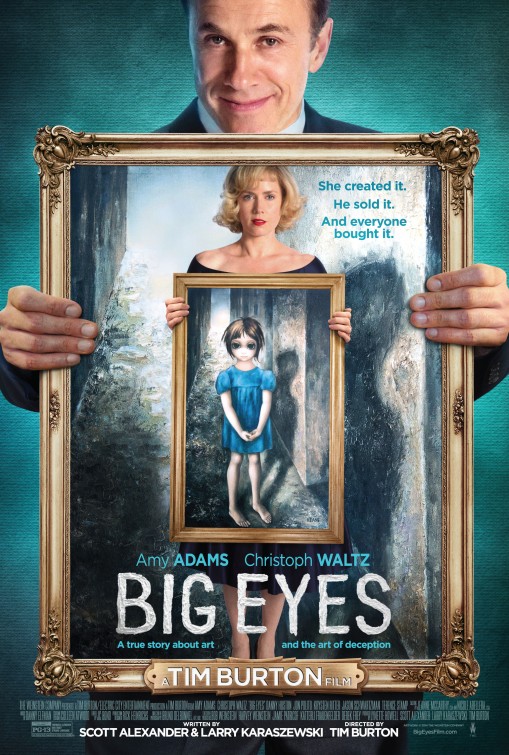
After a long string of remakes and adaptations of various
bits of media, Tim Burton scaled back things quite a bit for his next film.
With a small $10 million budget, Burton helmed the second biopic of his career in
2014 with Big Eyes. This film tells
the true story of artist Margaret Keane, who is most well-known for her
portraits of ‘big-eyed waifs’ that became hugely popular during the 60’s.
However, as it turns out, during their successful run the whole world was led
to believe that they were actually done by her husband Walter Keane. It’s a
fascinating story with a terrific arc for Margaret as she learns to stand up
for herself in order to get the credit that she truly deserves for her ‘big
eyes’. Amy Adams is absolutely fantastic in the role of Margaret, making her an
incredibly endearing person with the aforementioned terrific character arc.
Christoph Waltz is also fantastic in the role of Walter, as Waltz’s charisma
perfectly fits Walter’s talent for showmanship, hence why he was able to turn
Margaret’s paintings into the global phenomenon that they became despite the
fact that he was taking all the credit for it. Stylistically, Burton definitely
toned down a lot of his usual visual directing habits for this film,
restricting it to mostly scenes in which Margaret imagines other people having
big eyes like the children in her paintings. But despite that, it still very
much feels like a Burton film and it sports a nicely bright color scheme that
no doubt matches the art seen on screen. At the end of the day, what ultimately
mattered was the story of what Margaret Keane had to go through, namely dealing
with her credit-stealing husband, in order for her to take full credit for her
work. And as a result, Big Eyes is
definitely one of Burton’s best films. It’s certainly one of his most
scaled-back efforts from a filmmaking perspective but considering the
increasingly negative opinion towards his more recent big-budget efforts, I
have the feeling that many people were happy to see him dial it back with this
film.
Rating: 5/5!
No comments:
Post a Comment